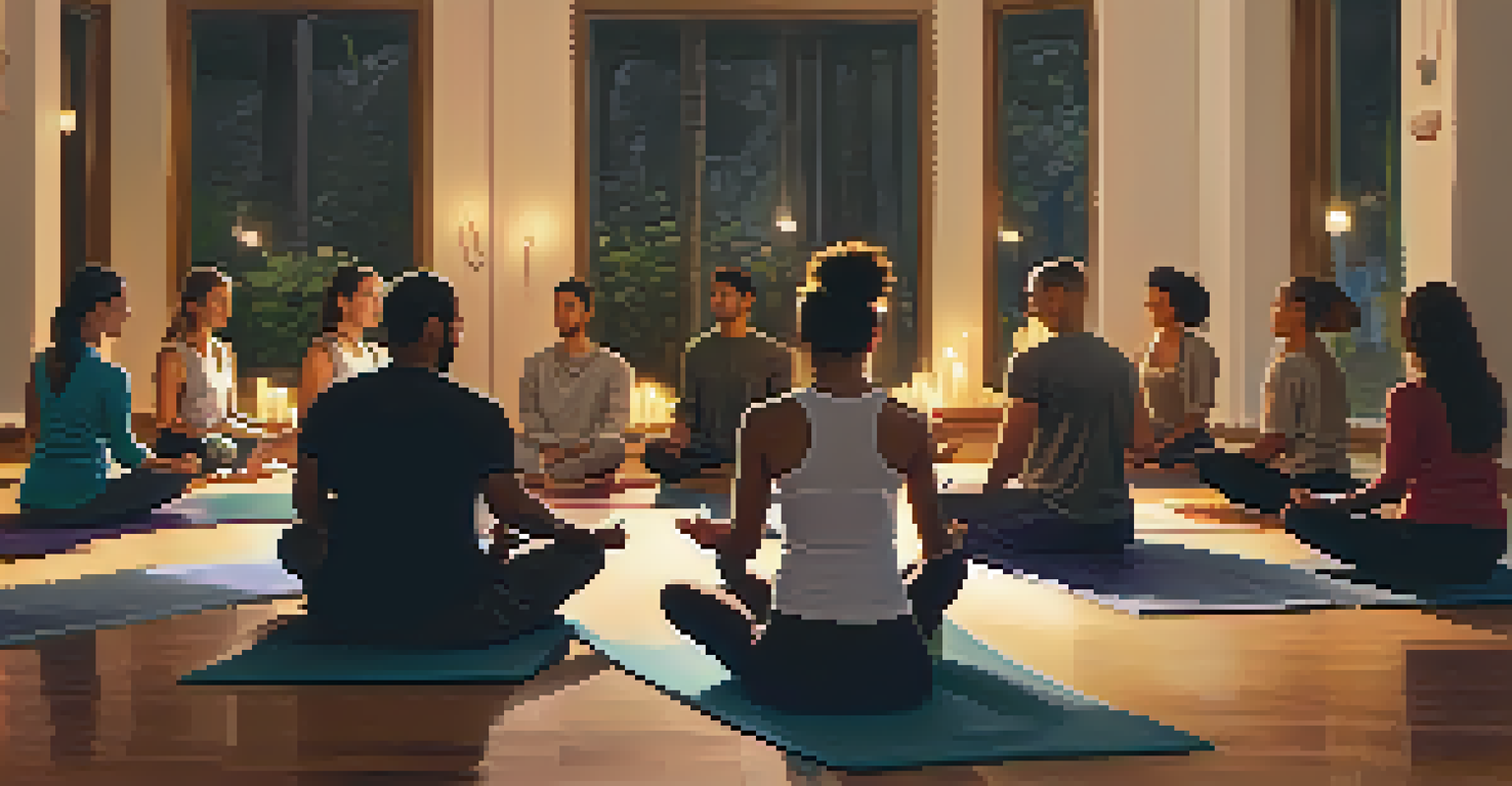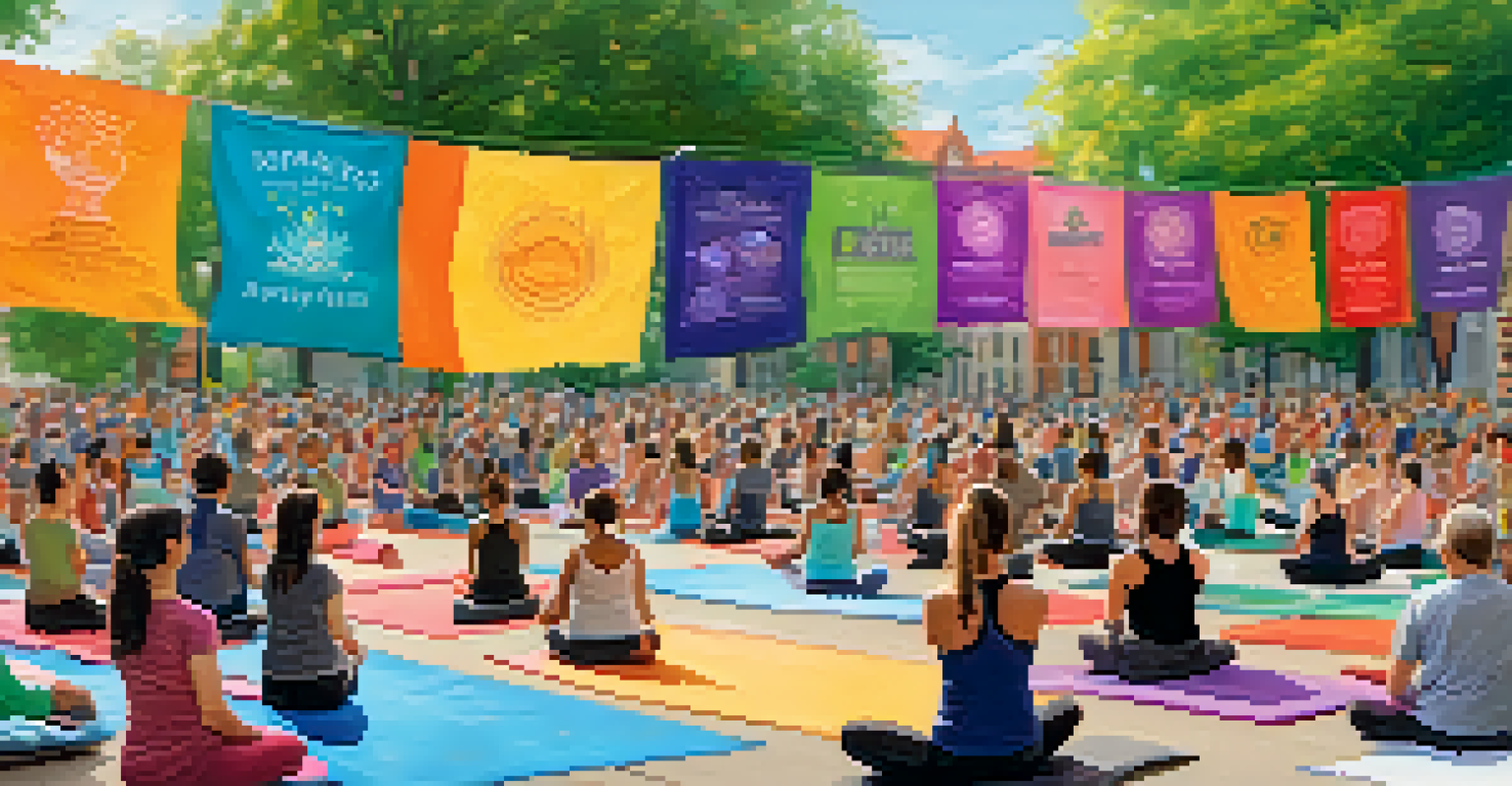Building Community: Yoga Classes for Activist Groups

The Power of Community in Activism
Activism thrives on community support, creating a sense of belonging among individuals dedicated to a common cause. When people unite for a shared purpose, they can amplify their voice and impact. Building a strong community can lead to greater resilience, as members provide emotional and logistical support to one another.
Alone we can do so little; together we can do so much.
Yoga, while often viewed as a personal practice, inherently fosters connection. It encourages participants to be present, listen, and share their experiences, creating a nurturing environment. This spirit of togetherness can be pivotal in harnessing the collective energy needed for activism.
Moreover, a supportive community can help mitigate burnout, which is common in activist circles. By connecting through yoga, members can recharge and refocus, ensuring they remain effective in their advocacy efforts.
Yoga as a Tool for Activist Resilience
In the fast-paced world of activism, stress management is crucial. Yoga offers a variety of techniques, from breathing exercises to mindfulness practices, that help individuals cope with pressure. These techniques not only enhance physical well-being but also promote mental clarity and emotional balance.

Through regular yoga classes, activists can cultivate resilience, allowing them to face challenges with a renewed sense of strength. The practice encourages self-reflection, which can lead to a deeper understanding of one’s motivations and goals. This clarity is essential for maintaining focus amid the chaos of activism.
Community Strengthens Activism
A strong community provides emotional and logistical support, enhancing resilience and collective impact in activism.
Additionally, engaging in group yoga sessions can foster a sense of unity. As participants share their struggles and victories, they build a supportive network that can bolster their efforts outside the yoga studio.
Creating Inclusive Spaces for All Activists
Inclusivity is a cornerstone of effective activism. By offering yoga classes that cater to diverse groups, organizers can ensure that everyone feels welcome and valued. This could mean providing classes for various skill levels, body types, and backgrounds.
The best way to find yourself is to lose yourself in the service of others.
Creating a safe space for all participants allows for open dialogue, where individuals can express their views and experiences. This exchange not only enriches the yoga practice but also strengthens the community by fostering understanding and empathy among members.
Moreover, by embracing inclusivity, activist groups can tap into a broader range of perspectives and ideas. This diversity can lead to more innovative strategies and solutions, ultimately enhancing the impact of their collective efforts.
Finding the Right Yoga Instructor for Activists
The choice of a yoga instructor can significantly influence the experience of an activist group. It’s essential to find someone who understands the unique challenges faced by activists and can facilitate a supportive environment. Instructors who are well-versed in trauma-informed practices can create a space that prioritizes safety and healing.
Additionally, an instructor who aligns with the values of the group can enhance the sense of community. This connection can inspire participants to engage more fully, both in their yoga practice and their activist efforts. A shared commitment to social justice can deepen the bonds formed during classes.
Yoga Boosts Activist Well-Being
Yoga practices help activists manage stress, cultivate resilience, and foster a sense of unity among participants.
To ensure a good fit, activist groups might consider inviting potential instructors to lead a trial class. This allows participants to gauge the instructor's style and approach, ensuring that it resonates with the group’s needs and values.
Incorporating Activism Themes into Yoga Classes
Integrating themes of activism into yoga classes can create a more enriching experience. Instructors can incorporate discussions around social justice, environmental issues, or community resilience, making each session not just about movement, but also about purpose. This can deepen the connection between the practice and participants’ activism.
For example, a class could focus on themes of empowerment, encouraging participants to visualize their goals and aspirations for change. Guided meditations might center on the importance of compassion, both for oneself and for others in the community. These elements can transform a typical yoga class into a powerful, purpose-driven experience.
This thematic approach can also serve as a catalyst for action. Participants may leave the class feeling inspired and motivated to take concrete steps toward their activism goals, creating a loop of engagement that reinforces both yoga practice and activist efforts.
Building Lasting Relationships Through Group Yoga
Group yoga classes provide an excellent opportunity for activists to build meaningful relationships. As participants share their experiences on and off the mat, they can develop deeper connections that extend beyond yoga sessions. These friendships can foster collaboration and support in both personal and activist endeavors.
Moreover, the shared vulnerability of practicing yoga together can create a strong bond among participants. As they navigate physical challenges and emotional moments in class, they learn to trust and rely on one another. This camaraderie is essential for a thriving activist community.
Inclusivity Drives Effective Activism
Creating inclusive spaces in yoga allows for diverse perspectives, enriching the activist community and fostering innovative strategies.
Ultimately, the relationships formed in yoga classes can lead to collaborative projects, strengthening the community’s impact. Activists who trust each other are more likely to work together effectively, creating a ripple effect of positive change.
Promoting Well-Being Through Community Yoga Events
Hosting community yoga events can be a powerful way to promote well-being among activist groups. These events can serve as both a form of self-care and a platform for raising awareness about specific causes. By aligning yoga with activism, groups can attract a wider audience and inspire more people to get involved.
Such events can also provide an opportunity for education, where participants learn about important issues during or after the yoga practice. Inviting speakers or presenting information in a relaxed setting can foster a greater understanding of the challenges faced by various communities.

Additionally, community yoga events can enhance visibility for activist groups. By showcasing their commitment to well-being and social change, they can engage new supporters and build a stronger network of allies.